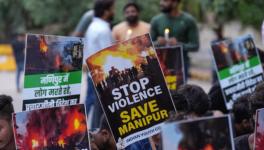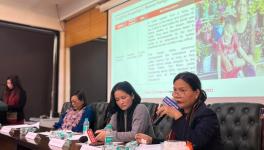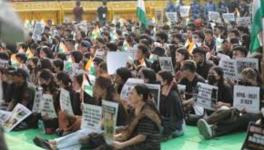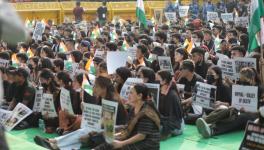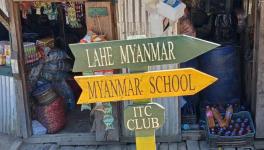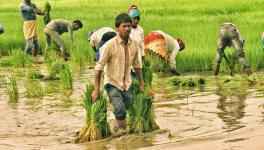Manipur: ‘Ostracised’ Kukis Facing an Existential Crisis, Claim Activists
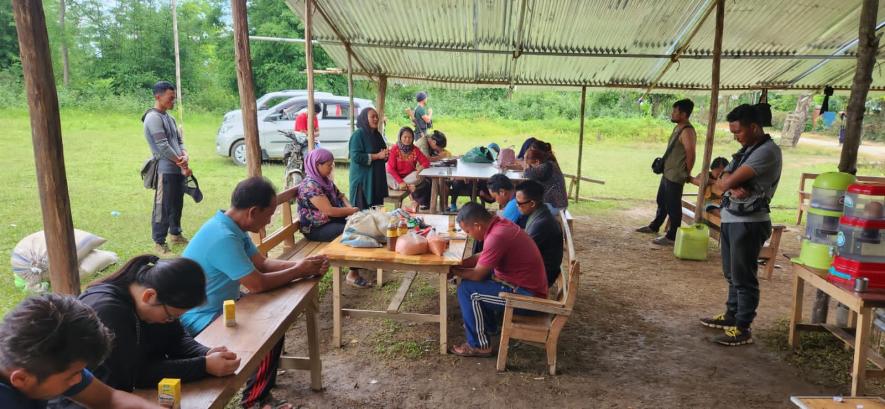
Images by Sandip Chakraborty
Aizawl: Living conditions seem dismal in L. Thingkangphai village in Chandel district of Manipur. Most of the families here say they find it difficult to arrange for two square meals a day. The village lies in the frontline of where regular clashes between the Meiteis and Kukis are going on.
The village has no medicines, no food, and no essential supplies coming in from the valley. The supplies that are available are from the Aizawl (Mizoram) side, where, despite the inhospitable terrain, food and other supplies are arranged by organisations, such as YMA or the Young Mizo Association.
However, these supplies are not adequate, leading to escalation of prices of essential items. Pulses are not available and the frontline Kuki volunteers here are surviving on rice stew, Martin Haokip, a senior leader of the Kuki volunteers, told NewsClick.
The Kuki volunteers were fighting with arms “to protect their land being overrun by the Meiti militia and heavily armed police commandos who were aiming to take over the hill areas from Kukis, he alleged.
Haokip alleged that police commandos were using mortars on the civilian settlement along the buffer zone, adding that the Kukis were also “retaliating sometimes through hand-made cannons and rifles.”
The Meitei people represent around 53% of the population of Manipur state and mainly live in the plains, followed by various Naga ethnic groups at 24% and various Kuki/Zo tribes (also known as Chin-Kuki-Mizo people) at 16%, mainly living in the hills.
As one goes slightly into the interior from the Lamka frontline, the residence of David Lunminlen, a Kuki youth leader, can be spotted. He is said to be keeping himself well aware of the developments on the frontline and is worried for the security of the elders in the area should there be a situation “where police commandos and Meitei militia get an upper hand” in the continuing warfare.
According to a professor who teaches in Mizoram University and wished anonymity, the ruling Bharatiya Janata (BJP) government of Manipur tried to enforce forest laws which was sure to create conflict over land. This was the blunder of Biren Singh's government which automatically led to the outbreak of the present ethnic clash.
The scenario in Manipur is such that the majority Meitei people cannot venture into the hills, while the Kuki/Zo people cannot venture into the valley. Therefore, it is unlikely that Meitei people and Kuki-Zo people will be able to settle amicably under a single administrative unit. Therefore, appropriate solution to the ongoing problem should be provided by the authorities concerned where the two communities can live peacefully within their own jurisdiction without any chaos and disturbances, he said,
Dr Mary Grace Zou of Delhi University, who is also convenor of the Kuki Women’s Forum, is also perturbed about the situation. She is already booked in an FIR by the Biren Singh government for demanding a special state or Union territory in the hills of Manipur “because the administrative mechanism in the hills and in the Imphal valley has been washed away by the current spate of ethnic clashes.”
“People from the Kuki community are facing an existential crisis in Manipur,” she told NewsClick.
After May 3, when ethnic clashes first broke out in the Imphal valley only to engulf the state within days, the administrative separation of the state of Manipur seemed imminent, though no political party of Manipur was clearly in favour of it -- be it the ruling BJP or the 10- party alliance of Congress, CPI(M) , CPI and other political outfits. No valley-based party was clearly showing any support for this demand proposed by leaders of the Kuki tribal community, who, it has been alleged, is at the receiving end of the ethnic clashes.
The scenario in Manipur is such that the majority Meitei people cannot venture into the hills that are dominated by the Kuki and Naga tribes, while the Kuki people cannot venture into the state capital of Imphal and its 700 sq km radius, which some Imphal valley-based insurgent group term as Kangleipak, their kingdom.
So much so that even the 10 Kuki MLAs cannot venture to Imphal. The electoral equation in the Manipur state legislature is such that there are 40 seats for the Meiteis in the 60-seat Assembly, with 10 each for the Kuki and Naga tribes.
As of now, a total failure of the administrative mechanism in the state is visible, with valley-based insurgent groups and a social organisation Meitei Leepuns and Arambai Tenggols, a revivalist organisation, are said to be “controlling” the valley, along with the state police, said political observers.
Though the original version of the strife, as put forward by a section of political analysts, was that a war had broken out between the religious ethnic groups of the Meitei Hindu community and the Christian community, but now “seemingly the fight is between the followers of Sannamei religion , which pre-existed before the Meitis took to Hinduism as their religion in the 18th Century.” The valley- based insurgent group are allegedly even killing mainland Hindus now, according satp.org (South Asia Terrorism Portal).
Arambai Tenggols are said to be a revivalist group that has created this nomenclature in the mainstream Meitei community. They have now said to have “reformed” themselves as a militant group, like the Meira Paibis, the Manipuri women’s group, who earlier was vocal against the Army’s “human rights abuse” but are now allegedly themselves “indulging in human rights abuse” of Kuki women in areas of their domination.
Interestingly, military and paramilitary forces have created a buffer zone between the areas under Meitei and Kuki domination. The heavily guarded buffer zone was created in the second week of the ethnic clashes after the Kukis came under “sudden attack”, allegedly from Meitei groups, only to regroup later under ITLF (Indigenous Tribal leaders Forum) and forming the UTV (United Tribal Volunteers) and Kuki INPI Tribal volunteers. The latter is said to be a form of “self-government” predominant in Manipur, wherein the village chief is known as Houza, while the defence minister is known as Pachong.
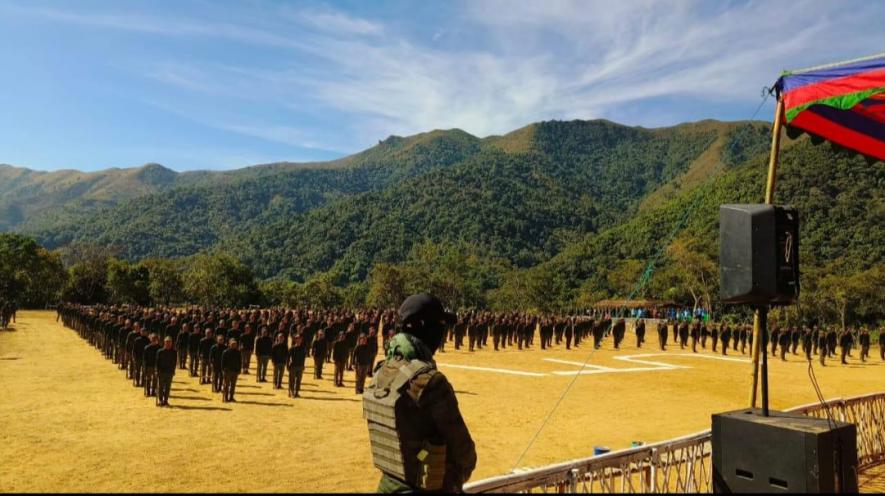
According to Kuki INPI, there are about six lakh Kukis in Manipur, using the CHIKIM nomenclature—Chin-Kuki-Mizo -- who are all Christians. So far about 5,000 Kuki houses have been burnt down in the strife, 256 churches set ablaze with 187 Kuki persons dead, according to Len Chongloi, information minister of Kuki INPI, who are close relatives in the “Imphal carnage”. His house was also burnt down after valuables were looted.
“We have been tormented for ages by the mainstream and you can see that Lamca, situated about 55 km from Imphal, does not have an adequate number of schools or hospitals. The hill districts -- Pherzawl , Churachandpur ( Lamka) Chandel, Tengnoupal and Kangpokpi -- still reel under poverty, but everywhere the tribal volunteers team has been formed to guard their respective areas from the Meiteis,” said Thangboi Mate from Lamka, a student .
He claimed students were “arming themselves” to save their elderly parents and were forming “Army -like contingents” to save their area.
On the Meitei side, about eight valley-based insurgent groups and the Arambai Tenggols, were said to be dependent on the “arms snatched” for the government armoury. Some 4,000 arms and five lakh ammunition were snatched from the Manipur government armoury, allegedly by Meitei groups. The Kuki groups are said to be mainly dependent on indigenously made cannons, muskets, double barrel rifles and single-barrel fire arms sourced indigenously, Mate said.
“It was only in 2017 that the Biren Singh government started calling us ‘refugees’, even though we have been living in our land for centuries and have even fought a fierce war with the Britishers, called the Anglo Kuki war from 1917-1919. As a result. 23 Chiefs of Kuki Tribes were deported in different jails of Burma (Myanmar), said a senior leader of KNO, an organisation that is in suspension of the operations agreement with the Central government following their accord in 2008.
“At one point of time, even tweeting against the Biren government was perceived as a crime, and they went on to create a narrative that Kukis are engaging themselves in poppy cultivation. As a Lamka resident, I can say that less than 3,000 hectares of land is under poppy cultivation in the entire hill districts. But it is most unfortunate the way the Arambai Tenggols earlier used to enter our locality and thrash Jhum cultivators, and charge them of being engaged in poppy cultivation. The 100 days of work (under MGNREGA) is not available in the hill districts of Manipur, as are the central funds,” he added.
There are only 2,194 illegal migrants in Manipur. as per Assam Rifles estimates, most of them were thrown out of their homes in Mynamar due to the civil war. So, is it feasible for the state to “wage a war against the Kuki community” in the name of tackling “illegal migrants' ', said a senior KNO leader requesting anonymity.
Get the latest reports & analysis with people's perspective on Protests, movements & deep analytical videos, discussions of the current affairs in your Telegram app. Subscribe to NewsClick's Telegram channel & get Real-Time updates on stories, as they get published on our website.









